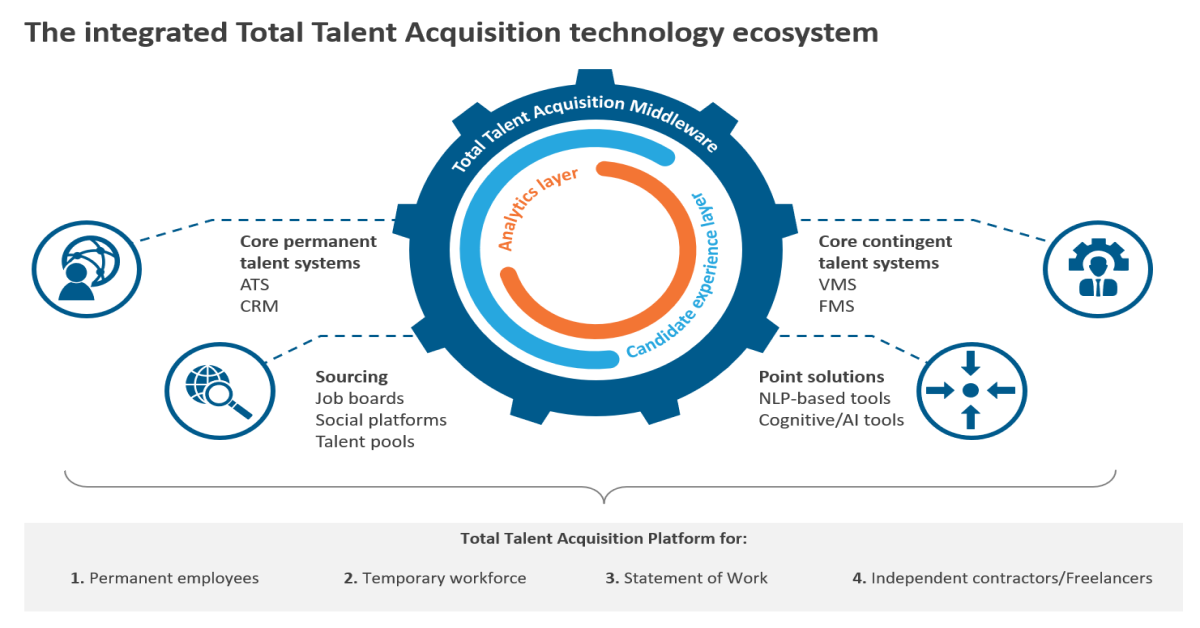Technology Imperatives for a Successful Total Talent Acquisition (TTA) Program
Because of changing workforce and business conditions, enterprises are increasingly using a mix of permanent full time and contingent workers. They’re also increasingly considering the concept of Total Talent Acquisition (TTA) to gain competitive advantage when it comes to meeting their own strategic goals and the needs of different types of talent. A recent study by Everest Group validated this observation by highlighting a 20% y-o-y growth in the number of enterprises outsourcing their talent needs to one provider in a TTA construct.
While there are multiple facets to building TTA capabilities, one of the key imperatives is a strong technology foundation. Unfortunately, today’s marketplace only offers one-off plug and play tools that can satisfy discrete enterprise requirements, such as Applicant Tracking Systems (ATS) for permanent employees, Vendor Management Systems (VMS) for temporary labor, and Freelancer Management Systems (FMS) for independent contractors / freelancers. Lack of a holistic TTA technology solution is a clear gap in the market right now.
Why hasn’t a comprehensive one-stop solution for true TTA yet been developed? There are a couple of key reasons:
• Most recruitment technology vendors focus exclusively on one type of talent – e.g., just permanent or temporary – and lack the technical proficiency to create a platform that addresses the entire blended workforce
• Enterprises have change management concerns around uniting different departments, like HR and procurement, that manage different talent initiatives
That said, a recent Everest Group study found that 25-30 percent of referenced enterprises are beginning to prioritize investments in TTA; so, the value of the anticipated benefits are clearly outweighing their concerns. And there’s no question that vendors and service providers will take action to satisfy that new market potential!
Tomorrow’s integrated technology ecosystem
Building a new TTA platform from scratch may not be a feasible approach given the distributed and discrete nature of existing platforms on the permanent and contingent side. Rather, the aim should be to create a holistic TTA ecosystem that integrates and augments existing technologies instead of replacing them.
Here are some of the important features and functionalities we believe an efficient TTA technology solution should have:
• “Middleware” as an integration source: A middleware platform that integrates all existing talent acquisition and management tools and systems, and acts as a single source for assimilating and analysing data from all the integrated systems
• Sourcing the ideal talent: A one-stop shop for sourcing both permanent and contingent talent from various sources such as job boards, social media platforms, career landing pages, and internal (silver medalists, alumni, interns etc.) and passive talent pools
• Screening and assessment: A comprehensive tool having initial screening and assessment capability for finding suitable talent using technologies like artificial intelligence, machine learning and gamification
• End-to-end talent acquisition experience: Intelligently leverage standalone tools to streamline candidate experience. Some of such tools include chatbots, real-time interview scheduling and video interviewing. All accessible by recruiters and hiring managers from the same single system, rather than multiple, discrete systems
• Enhanced visibility and in-depth insights: Descriptive and prescriptive analytics that can help predict workers who are best suited for a particular role; provide an ability to switch and decide between permanent and temporary talent; allow automated matching of candidates to open positions; and provide additional insights across market data, supplier optimization, spend reduction, peer benchmarking, demand management, and workforce planning
• Enveloping machine learning layer: An embedded layer of artificial intelligence and machine learning to make all the functionalities efficient and continuously intelligent over time

An efficient TTA technology solution will help enterprises achieve their strategic, business, and cost saving objectives. But creating an end-to-end ecosystem with all the above features and functionalities will require a clear roadmap and a phased approach by all stakeholders involved, including enterprises, technology vendors, and outsourcing partners. As workforce management continues to transition toward TTA, we believe an integrated platform will be an organizational clincher and a pathfinder for a successful evolution.
-min.png)



